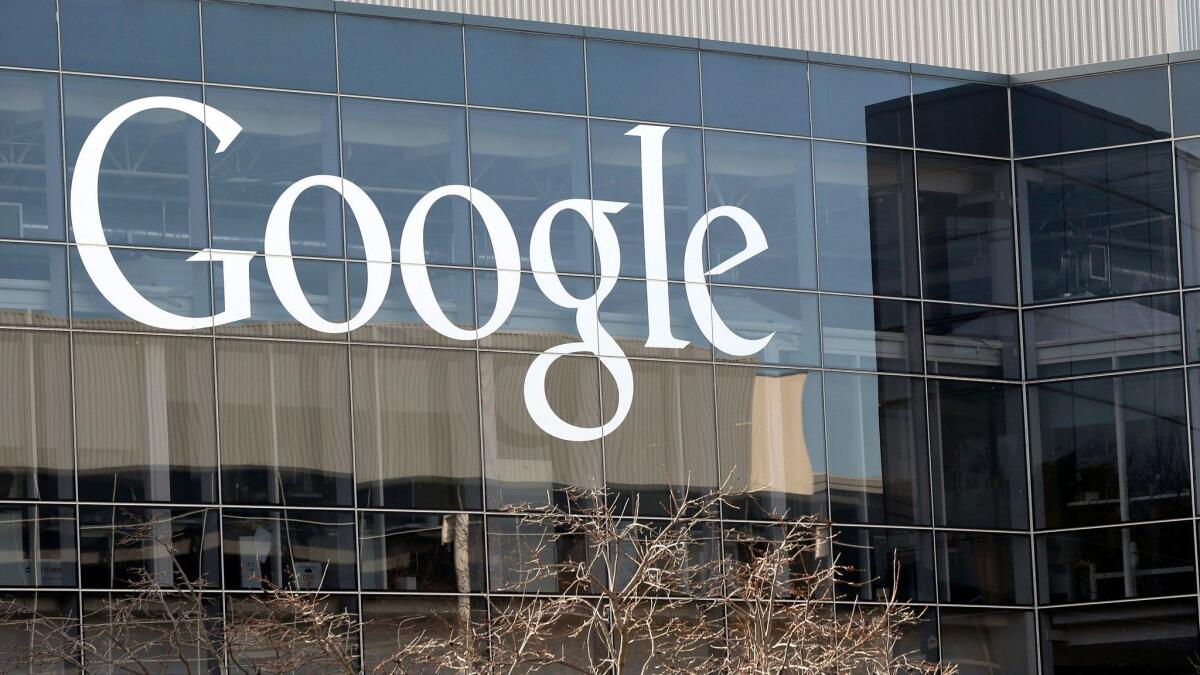Google workers unionize, a watershed in Silicon Valley activism

- Share via
For much of the last two decades, the engineers, developers, and designers who helped grow Google into one of the world’s largest companies rode a wave of success mostly quietly, buoyed by high salaries and the thrill of their rapid-fire innovation.
Now they are among the loudest voices in Silicon Valley, shepherding a new workers’ union — announced Monday — in a rare effort that aims to overhaul the relationship between the internet giant and its employees. Though relatively small and with limited powers, the new Google union represents a rising brand of labor activism that is putting a fresh spotlight on the tech industry’s disparities and pressuring its elites.
More than 400 workers across Google and other units of Google’s parent Alphabet Inc. have signed up for the union, which has been quietly in the works for about a year, people involved or familiar with its organization said. It marks the culmination of years of walkouts, petitions and increasingly public discussion among tech employees related to race, ethics in technology, and other issues - yet very few have voted to formally join a union until now.
The effort by Google employees is the first of its kind among big tech companies. It is unique for its focus on what employees describe as the civic and ethical responsibilities of their employer — and the say that workers should have in that.
“If your main motive is profit, you may not put ethical concerns as high as the profit motive. We want to serve as a counterbalance to that,” said Isaac Clerencia, a site reliability engineer in Google’s Mountain View, Calif., headquarters. “We deserve meaningful control over the projects we work on & the direction of this company,” the group, called the Alphabet Workers Union, posted in a series of introductory Tweets.
The group is not structured as a traditional, contract-bargaining union. Because it represents a minority of company employees — Google has over 130,000 employees, according to a recent SEC filing — the group cannot negotiate a contract on behalf of unionized workers. Unlike in a traditional union, it allows for the company’s part-time or contractor employees to join alongside full employees, an option organizers said was crucial to their goal of helping improve conditions for contractors who make up a large part of the Google workforce yet get lower pay.
“I’m happy with the money I make and the benefits,” said Auni Ahsan, a Google software engineer and at-large member of the union’s executive council. “But I can’t be content with that if I don’t think my work is helping the world, or if it’s contributing to oppression.”
In a statement, Google spokeswoman Kara Silverstein said: “We’ve always worked hard to create a supportive and rewarding workplace for our workforce. Of course, our employees have protected labor rights that we support. But as we’ve always done, we’ll continue engaging directly with all our employees.”
The Google union came together with support from the Communications Workers of America, a labor group representing about 700,000 workers that launched a campaign earlier this year aimed specifically at unionizing video game and tech companies in the U.S. and Canada. The NewsGuild, a union that represents L.A. Times employees and other news outlets, is part of the CWA.
People involved in the efforts say Google workers were split on whether to work with CWA or forge an entirely independent path. The partnership could prove pivotal to the effort’s ripple effects, said Veena Dubal, a law professor at UC Hastings College of the Law. Workers at other big tech companies such as Amazon and Facebook might make similar moves, Dubal said, noting that traditional unions have less experience with the kind of ethical questions that arise in the tech industry. For this group to become a model, the Google workers should “stay in the driver’s seat,” she said.
The new union held officer elections and established bylaws last month, CWA spokeswoman Beth Allen said.
Current and former Google employees described the union as a way to institutionalize activist work gaining traction over the years within the company, both on its internal forums and in after-hours organizing.
Meredith Whittaker, an artificial intelligence researcher and a former employee called it “the logical next step.” She helped organize a global walkout in 2018 to protest Google’s handling of sexual harassment claims.
In recent years, Google workers have protested — in some cases successfully — how the company has handled alleged incidents of sexual harassment, what employees describe as disparate treatment of contract workers, and some business decisions including contracts with the military or law enforcement agencies.
“Yet problems persist,” the union said in its introductory posts on Twitter, citing alleged discrimination, harassment, and retaliation. Referencing Google’s contract workers, sometimes described as “a shadow workforce,” the group said: “A few at the top are getting enormously rich while others see nothing of that wealth.”
These workers — who fill a range of roles, from serving meals in the cafeteria and cleaning offices, to writing code, handling sales and managing teams — are employed through secondary companies, with little direct oversight of their pay and work conditions. “They need someone to fight for them,” said Raine Serrano, a Google privacy software engineer in Seattle.
Nearly 200 people joined the union Monday, organizers said, underscoring the galvanizing nature of the effort. Some said it was years of activist work, and broadening discontent within the company, coming to life.
As early as 2010, employees fought against a policy requiring users of Google Plus to use their real names, arguing it would endanger the safety of vulnerable users, including LGBTQ people. The company ultimately changed the policy. In another instance, employees pressured the company to cancel a significant drone contract with the Department of Defense, dubbed Project Maven.
The biggest and most public show of collective action came in 2018, when thousands of employees marched out of Google offices worldwide to protest how the company handled sexual harassment claims against one of its executives.
The closest effort to the union announced Monday came in late 2019, when a group of tech contractors working in Google’s Pittsburgh office voted to unionize. That sparked in earnest a conversation that had only been discussed in passing about what a union could look like for Google employees.
The broader unionization effort took off in late 2019 when the CWA filed a complaint with the National Labor Relations Board saying Google wrongly fired and violated the rights of two employees who had organized or participated in internal and external activism and protests.
Company employees and those familiar with said the group’s numbers grew last month after Timnit Gebru, a prominent artificial intelligence researcher and ethicist, said Google fired her after she challenged the company on its approach to AI ethics and, more broadly, diversity hiring practices. The incident was a high-profile public blowout, with some employees coming to Gebru’s defense and asking the company for more transparency on the circumstances around what happened.
Minority unions, such as the new Google group, began in the industrial era as first step to mobilize and channel workers’ discontent with a broader goal of gaining more power in the workplace, said Toby Higbie, a professor of history and labor studies at UCLA.
It would probably be difficult for employees in a company as large as Google to reach a critical mass of workers and hold elections for a traditional union straight away, he said. Workers at Walmart made a similar effort through a minority union a few years back that appears to have lost momentum, he said.
“These minority unions only pan out if they’re member driven,” he said. “If people in the workplace see the organization as valuable to them as a representative, that’s the thing that will drive the union forward.”
Staff writer Johana Bhuiyan contributed to this report.
More to Read
Inside the business of entertainment
The Wide Shot brings you news, analysis and insights on everything from streaming wars to production — and what it all means for the future.
You may occasionally receive promotional content from the Los Angeles Times.











